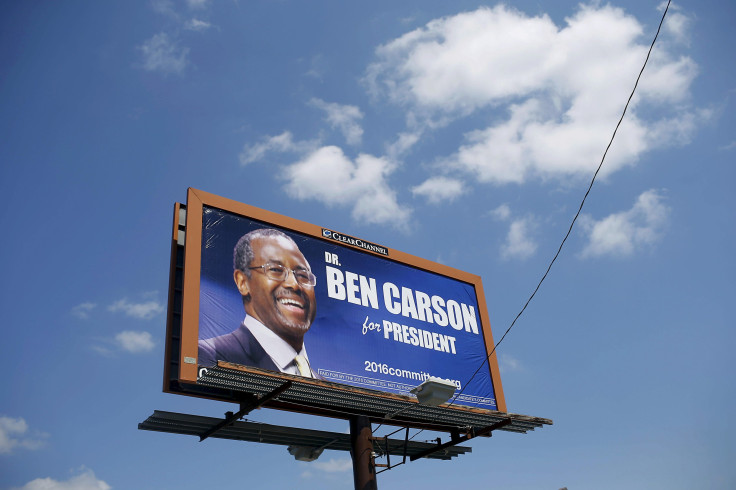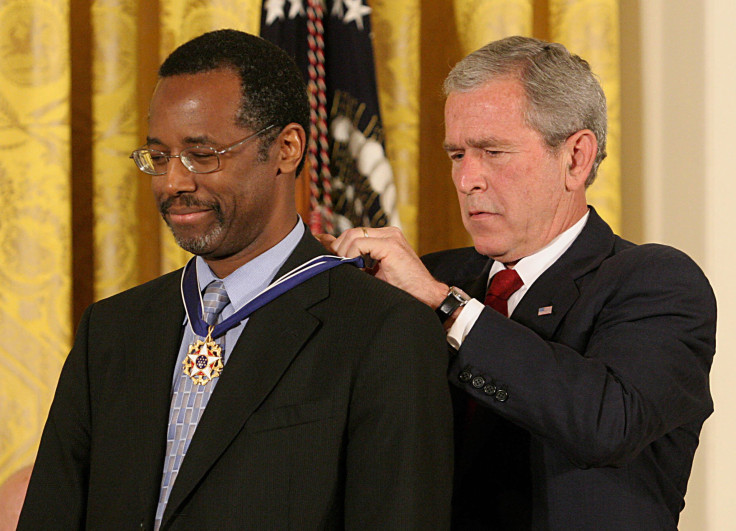Ben Carson And Black Republicans: Will More African-American Conservatives Warm Up To The Neurosurgeon-Turned-Presidential Candidate?

Dr. Ben Carson has used his ascent from abject poverty in Detroit to global acclaim as a groundbreaking African-American neurosurgeon with conservative and Christian values to help attract registered Republican voters regardless of race. But the candidate polling in the top-three of a crowded field of mostly white GOP White House hopefuls seemingly has a distracting penchant for hyperbole. Especially when addressing socioeconomic issues that disproportionately impact Black America, some black Republicans have suggested.
Some primary voters, especially those who are white and of an advanced age, might swoon over Carson previously comparing the Affordable Care Act to American slavery or his suggestion last week that abortion service provider Planned Parenthood’s locations in black communities are strategically stifling the growth of the black population, but that kind of rhetoric can be cringeworthy for some black Republicans who say they would like to see a conservative candidate like Carson succeed because of his authenticity on black issues and not for reinforcing old racial stereotypes.
“He has staying power because he comes across very authentic -- politicians would sell their firstborn for that quality,” said Raynard Jackson, a black conservative Republican who has been a political strategist and consultant in Washington for more than 25 years. “I think Ben Carson has taken this campaign seriously. He has dedicated himself to studying the issues,” Jackson continued before making a measured, if not cautious, comparison: “But my greatest fear was that he’d be another Herman Cain,” he confessed.
Jackson was referring to the African-American former Godfather’s Pizza chief executive from Georgia, who also initially polled well among a slate of white GOP candidates in the 2012 presidential election cycle by aligning himself with the right wing of the party on social and fiscal issues. Like Carson, Cain made inflammatory remarks about Planned Parenthood and abortions. But Cain’s painfully obvious lack of knowledge on geopolitical issues coupled with sexual harassment allegations and cartoonish behavior in the media ended his campaign midway through the primary season.
Carson, 63, spent time in the private sector with nearly 30 years in the medical profession before opting to seek America's highest public office. After more than four months since joining a field of 16 presidential candidates, he faces an uphill race for the Republican Party nomination against business tycoon Donald Trump and former Florida Gov. Jeb Bush, who had been polling first and second, respectively, ahead of the retired neurosurgeon. The latest national poll had Trump at 24 percent of Republican support, 11 points ahead of Bush, who had 13 percent. Carson polled a few points behind Bush at 9 percent.
But by the time he released his acclaimed autobiography, “Gifted Hands,” in 1992, Carson had long risen out of what he described as the harshest conditions of poverty in rough Detroit neighborhoods by achieving several noteworthy accomplishments: He obtained degrees from Yale University and the University of Michigan Medical School; at age 33, he became the youngest pediatric neurosurgeon at Baltimore’s John Hopkins Hospital; in 1987 he successfully separated twins born conjoined at the head; and he was the first black director of the unit. The combination of medical triumphs resulted in Carson receiving many lofty accolades, culminating in the Presidential Medal of Freedom, the highest civilian honor, bestowed on him in 2008 by President George W. Bush.

But it was Carson's February 2013 speech at the National Prayer Breakfast that catapulted him into the stratosphere among black and white conservatives alike. After regaling dignitaries and attendees with a heartfelt account of his rise out of poverty and youthful shortcomings, Carson slammed moral decay and fiscal irresponsibility in the U.S. and blasted the “PC police,” foreshadowing a string of politically incorrect statements.
Several months later, Carson turned heads with his critique of the Affordable Care Act, a national healthcare reform law also known as Obamacare that is considered to be among President Barack Obama’s most significant political achievements. "You know Obamacare is really, I think, the worst thing that has happened in this nation since slavery … because it is making all of us subservient to the government, and it was never about healthcare," Carson said in remarks at the conservative Values Voter Summit in October 2013. The comparison was an attempt to equate the mandate that all citizens enroll in a healthcare plan or face tax penalties with the centuries-long, forced bondage of millions of Africans and African-Americans in the U.S.
Carson later admitted he regretted making the slavery allusion. But since then he’s made ill-phrased comments against gay rights, including a statement in March declaring homosexuality was a choice some people make while in prison. Following the release of undercover “sting” videos of doctors at a Planned Parenthood clinic discussing the sale of aborted fetal body parts, Carson said in an Aug. 12 Fox News interview that “most of their clinics in black neighborhoods [are] so that you can find [a] way to control that population.” Those types of statements show Carson still has not learned to deliver legitimate policy critiques with language that prove he is in touch with reality, some black conservatives have said.
“If you’re a black person with two grains of sense, you know slavery was disgusting,” said Crystal Wright, an African-American conservative and political TV pundit, who added that the number of black Republicans elevated to the presidential field is too small for virtually each one to spout rhetoric that reinforces stereotypes of blacks and minorities. “There are very few circumstances where this is acceptable [to make that comparison],” she said.
Carson’s stance on the role of institutionalized racism in the U.S. has proved divisive among black Republicans. His statements in 2014 that race as an issue “doesn’t mean that much to me” and was “contrived by liberals to divide people” are among the most troubling statements an African-American candidate can make, some black conservatives said. Others said he is right to talk about how blacks have achieved great things in spite of racism.
However, his personal story of triumph over poverty is one that transcends race and politics, said Wright, who agrees with Carson's stance on abortion. The “real Ben Carson” is at odds with the inexperienced candidate who needs to appeal to voters who have limited and even racist views of blacks, she said. “What’s happened to him is that he started listening to the rhetoric of what [the party] thinks you are supposed to say,” Wright said. “When Ben Carson talks about his opportunity message, that’s when he wins over black Republicans.”
Candy & I had the joy of joining Rev. Charles Jackson for service this morning at Brookland Baptist in Columbia, SC. pic.twitter.com/fBGdwqMqOK
— Dr. Ben Carson (@RealBenCarson) August 23, 2015While the Carson campaign did not respond to a request for comment, the director of his independently run super PAC said Carson has courted black Republicans in the early primary voting states of Iowa and New Hampshire.
“Dr. Carson is an unusual candidate in that he can expand the existing pie of support among people who have been historically disenfranchised or never participated in the Republican primary process before,” Chuck Muth, who leads the super PAC 2016 Committee, previously called the Draft Ben Carson Committee, said in a phone interview last week. Free copies of a newly released book about Carson’s accomplishments and origins have been deliberately distributed to predominantly black churches and community groups and will soon go out to the Latino community, with Spanish translation, Muth added.
Carson’s lack of tact on black issues should make it difficult for him to attract blacks in general, said Michael Tyler, the Democratic National Committee’s director of African-American media. “Sadly, Carson’s comments mirror the type of invective that has taken over the entire Republican field running for president,” Tyler recently said via email, echoing the sentiment expressed by Wright, the conservative political commentator. “Regardless of who emerges as their nominee, Republicans are making it clear that they’re not at all interested in fighting for minority communities.”
Jackson, the Washington political consultant, said he is hopeful Carson will show he’s not like previous black conservative candidates who fizzle out because they aren’t true to themselves. “Even if he loses, no one will be able to say that he’s not running a credible campaign,” Jackson said. “To me, that’s a victory for him.”
© Copyright IBTimes 2025. All rights reserved.






















